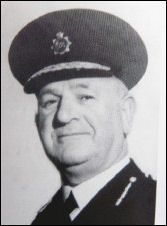Historian Fred Hughes writes....
One of the key jobs to be filled by the new Stoke-on-Trent council in 1910
was that of Town Clerk. It was all very tentative and uncertain so
councillors brought in the clerk to neighbouring Staffordshire County
Council Mr Eustace Joy to advise them.
“Eustace Joy became Stoke-on-Trent’s first acting Town Clerk,” explains
Potteries historian Steve Birks. “His job was to steer councillors through
the minefield of civil law and administration. There was so much business
that the first meetings were held on a daily basis. There was even some
talk about all-night sittings but that was squashed on account of Mr Joy
having to commute between Stoke and Stafford.”
It wasn’t long though before a short list of candidates for the permanent
post was drawn up.
“In those days the Town Clerk had to be a lawyer and wear a wig and
gown on official business,” continues Steve. “The councillors in
1910 decided that the candidate should not be older than 45 and of
course male. The annual salary was set at £1000 rising to £1,250, a
cut above the £800 the clerks to the existing six town councils were
paid. The other big post to be filled was the position of Chief
Constable. The man they appointed was the police chief of Hanley,
Roger Carter. Then there was the location of offices to be arranged.
Mr Carter was allowed to stay at his Hanley office in the Town Hall
while chambers for the Town Clerk were found at Stoke Town Hall. The
new constitution was next on the agenda and that certainly wasn’t
going to be resolved overnight.”
The new constitution had to define the Town Clerk’s duties. And here
councillors gave a wide scope to the new man. One wonders now
whether the councillors were a bit reckless in the freedom of
responsibilities they handed to the office. Certainly the
consequences of handing too much power to one man would soon come to
haunt them.
|
“The new Town Clerk was Edward Burgess Sharpley,” says Steve. “He was 35
and already held a similar job in his home town in Lincolnshire. Sharpley
was seen as a bit of a whiz kid and a great catch for the new council. He
was young and enthusiastic; extremely popular with friends but extremely
disliked by his enemies. Certainly he made friends in the beginning. But
he mostly out-served them by the end of a long career of 35 years. It’s
reasonable to say he was in complete control of Stoke-on-Trent and
directed both his staff and the councillors in an authoritarian manner. In
the hands of Mr Sharpley unelected civic power was awesome.”
One department Mr Sharpley insisted upon leading was that of criminal
prosecutor in police courts. It was an archaic system that gave the Town
Clerk overall control of who should or should not be prosecuted – a role
these days undertaken by the Crown Prosecution Service. And it’s worth
remembering that on the whole the magistrates’ list was mainly filled by
the same councillors who were already being directed by Mr Sharpley in
civic matters. It was a situation dangerously loaded with suspicion and
bias and one that prevailed until the arrival of a new Chief Constable in
1936, an equally strong character named Frank Bunn.

Frank Bunn - Chief Constable in 1936
“Mr Bunn was in charge when I joined Stoke-on-Trent City Police in 1947,”
says retired Stoke-on-Trent City Police officer Roy Matthias. “He was he
was a magnificent leader, highly thought of by his men and city leaders
alike. He accomplished a great deal for law and order in Stoke-on-Trent.
His appointment was inspirational and he brought a breath of fresh air
into what must have been troubled times, although he never let it
interfere with his performance.”
Confrontation between the new Chief Constable and the Town Clerk was
inevitable and instantaneous. While Roger Carter had been a diplomatic
policeman described in the Sentinel’s obituary as a ‘kindly and genial
man,’ there’s no doubt he fell under the influence of the Town Clerk.
According to police historian the late Alf Tunstall, Mr Sharpley appeared
to run the council like some feudal baron overseeing his possessions,
which included the police service. Frank Bunn instantly objected to this
authority and said so. The outcome was a very messy public enquiry
concerning abuse of power and public standards.
“Records indicate that Sharpley had a marked disregard for another’s
feelings,” Alf told me. “Mr Bunn on the other hand was a strong character,
a barrister in his own right, the professional equal of Sharpley. He
taught his men respect and honesty as well as crime prevention and
detection.”
Bunn’s own version of these confrontations is well documented in his
memoirs. Suffice to say that it might have been Sharpley’s
self-assuredness that brought him before the stipendiary magistrate in
1943 to be found guilty of indictments over the misuse of petrol during
wartime. He was fined for the proven cases but lack of criminal intent
enabled him to keep his job. Mr Sharpley retired in 1946, a pioneer of
federation and civic administration.

click the "contents"
button to get back to the main index
